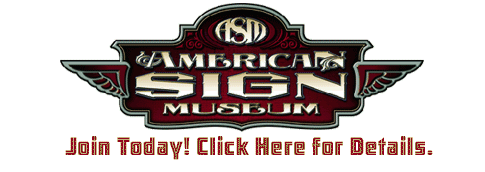|
|
|
The dust has settled from the museum's Grand Opening, and I'm resuming a normal routine, which means I'm acquiring signs. Preparations for the opening kept me in town for nearly six months. Enough signs are waiting to be picked up to keep me busy through the early fall. Shown and described here are a few recent acquisitions. ISA's Las Vegas show in early April provided the perfect opportunity for Roger Daniells, of C.R. Glow (Stockton, CA), to hand-deliver, among other items, a custom-made, neon, color-sample kit that once belonged to Ad Art, also of Stockton. Daniells also donated four, different sign tags from the former Electrical Products Corp. (Los Angeles), one of the earliest Claude Neon franchises. Two of three porcelain-enamel tags bear the mark of Zeon, a registered trademark adopted by an "invitation only" group of "licensed" neon companies, which promoted their "high standards in the luminous sign industry." The fourth tag bears an even earlier vintage (probably dating to the early 1930s). 
This neon, color-sample kit once belonged to Ad Art, formerly of Stockton, CA. Also, two of three porcelain-enamel sign tags from the former Electrical Products Corp. (Los Angeles) bear the Zeon mark adopted by a "licensed" group of neon manufacturers. Daniells also donated Electric Signs — Control of Lamps and Lighting, by C.E. Weiz, copyrighted 1939 and published by the International Textbook Co. (Scranton, PA). At the Grand Opening, Mike and Ayleen Meyer presented two other classic sign books: George F. Meyer's Electric Display Dynamics, copyright 1946, and the much sought-after The Art of Lettering and Signpainter's Manual, written by A.P. Boyce and published in 1878. 
Mike and Ayleen Meyer donated a stationary tri-vision that's tricky to photograph. Meyer also donated a very tricky sign that's difficult to photograph. The sign is a stationary tri-vision — one face is seen from the left, one from the right and one straight on. The three faces include the back sign face and two on either side of a series of slats, which are perpendicular to the back face. Salesman's samples provide examples of sign and/or sign components, but accompanying brochures, or other literature, usually reveal additional information. A recent eBay purchase, a Stewart Warner "Write-it-Urself Neon Sign," arrived in perfect condition in its original, felt-lined carrying case. Also, a handful of folded brochures told how "to increase your sales & profits" through the use of the sign. Pages of a larger, single catalog were devoted to sample messages for such end users as drugstores, men's furnishings stores and meat markets, as well as suggestions for effective copy layout, designs and alphabets. 
A recent eBay purchase, a Stewart Warner "Write-it-Urself Neon Sign," arrived in its felt-lined carrying case, along with product brochures and catalogs. |
